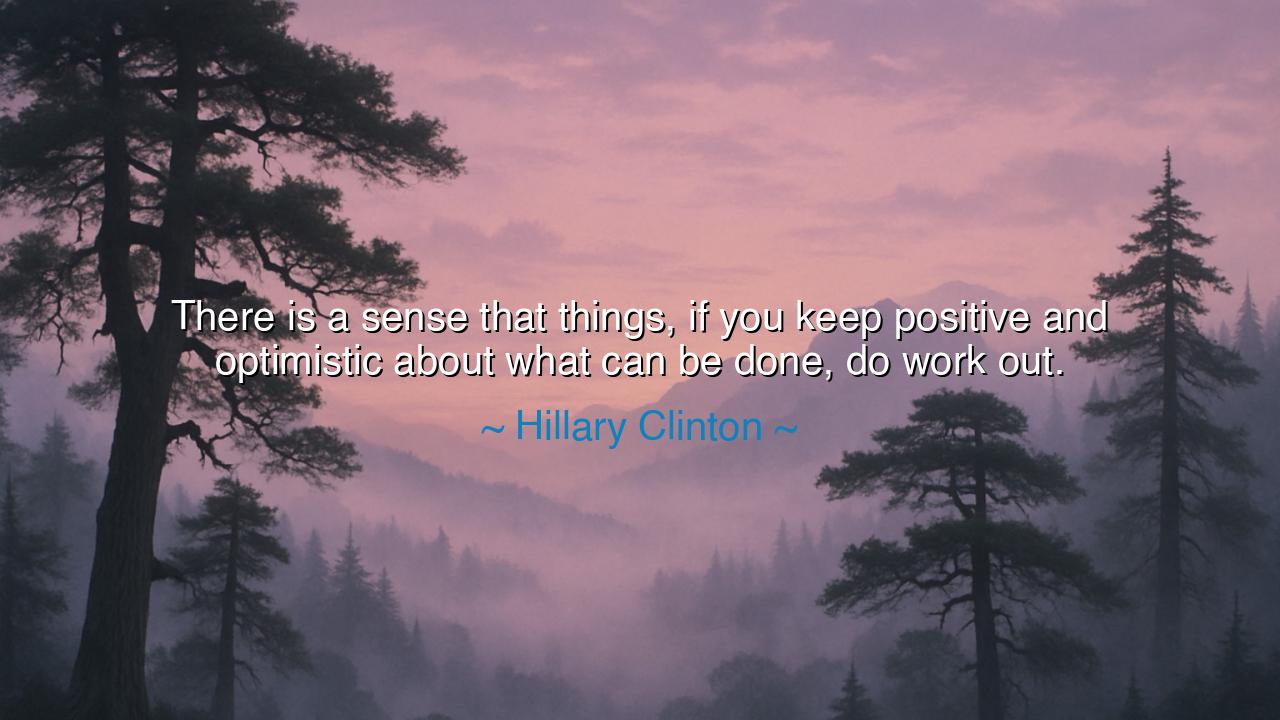
There is a sense that things, if you keep positive and
There is a sense that things, if you keep positive and optimistic about what can be done, do work out.






Hear, O listeners of the present age, the words of Hillary Clinton, who with steady resolve declared: “There is a sense that things, if you keep positive and optimistic about what can be done, do work out.” This is not the whisper of naïveté, nor the blind chant of wishful thinking. It is the voice of one who has walked through storms, endured defeats, faced ridicule, and yet has seen how steadfastness, coupled with positivity and optimism, can turn the wheel of fate toward triumph. For the human heart, when armed with hope, becomes like a lantern that guides the traveler through the darkest night.
The meaning of this saying lies in the power of the spirit to shape outcomes. Circumstances may appear immovable, adversaries may tower like mountains, and failure may press heavily upon the weary soul. Yet when a person remains positive, believing in the possibility of change, they do not surrender to despair. And when they remain optimistic, they keep their eyes fixed on what can be done, not on what is lost. In this way, they invite progress, summon allies, and open paths that defeat and bitterness would have sealed forever.
History is filled with such examples. Consider the story of Franklin Delano Roosevelt, stricken by polio, his body broken yet his spirit unyielding. Where another might have sunk into hopelessness, Roosevelt kept optimistic faith that he could still serve his people. With courage and cheer, he led America through the Great Depression and World War II, declaring to millions that the only thing to fear was fear itself. His positivity was not empty; it was power. It stirred his people to action, gave them courage, and in time, things did work out.
We see the same spirit in the life of Nelson Mandela, who endured twenty-seven years of imprisonment. Each day behind bars might have crushed him with bitterness, yet he remained positive about the future of his nation. He believed, against all evidence, that reconciliation could triumph over hatred. And when freedom came, his optimism forged a new South Africa, not born of revenge but of forgiveness. His life testifies to Clinton’s words: things do work out when one refuses to abandon hope.
Yet let us not misunderstand. To be positive and optimistic is not to deny reality, nor to close one’s eyes to hardship. It is to look hardship in the face and say, “You will not have the final word.” It is to act, to persevere, to labor with the conviction that struggle is not in vain. Those who despair weaken their hands before the task is even begun; those who hope, though battered, rise again until victory is won.
Children of tomorrow, take this lesson to heart: when trials surround you, guard your spirit from the poison of despair. Speak words of positivity to yourself and others. Remind yourself that even the longest night gives way to dawn. Focus not on what cannot be changed, but on what can be done, no matter how small. A seed sown in faith today may become a mighty tree tomorrow.
Practical wisdom says: begin each day with gratitude, for gratitude strengthens optimism. When failures come, ask what lesson they bring, and turn it into fuel. Surround yourself with voices that lift you higher, not those that drag you into cynicism. And above all, persist. For the river carves the stone not by force, but by endless persistence.
Thus, remember Hillary Clinton’s teaching: “If you keep positive and optimistic about what can be done, things do work out.” Carry this with you into your battles, your labors, your dreams. Let hope be your shield and optimism your spear. And in the fullness of time, you shall see that the path, though long and steep, leads to a summit where light breaks through and victory is revealed.
––






NNaq
This quote makes me reflect on practical applications of positivity. Can optimism be cultivated intentionally in teams, organizations, or communities to enhance productivity and problem-solving? What role does mindset play compared to resources, planning, and execution? I’d like to explore the interplay between believing things will work out and taking concrete steps to make them work out.
NLLuu Ngoc Lan
I’m intrigued by the connection between attitude and results. Does a positive outlook truly make events turn out better, or is it more about perception and emotional well-being? I’d like to understand whether optimism actually shifts circumstances in measurable ways, or whether it primarily helps people cope with challenges and persist toward solutions.
AAn
This raises questions about resilience and mindset. Could consistent optimism influence not only personal outcomes but also the morale and motivation of those around you? How does one maintain positivity in the face of repeated setbacks, and are there techniques for reinforcing confidence and constructive energy even when results aren’t immediately visible?
HDHoang Hai Dang
I find this perspective encouraging but wonder if optimism can sometimes create blind spots. How do we stay hopeful without ignoring potential obstacles or risks? I’d like to explore methods for balancing positive expectations with critical thinking, so that a hopeful mindset doesn’t inadvertently lead to disappointment or miscalculation.
LDDang Quang Le Dac
This statement makes me think about the role of optimism in problem-solving. Is positive thinking alone enough to ensure that things work out, or does it need to be paired with action and strategy? I’m curious how leaders like Clinton maintain optimism during complex challenges, and whether the belief that things will improve can actually influence outcomes psychologically or practically.